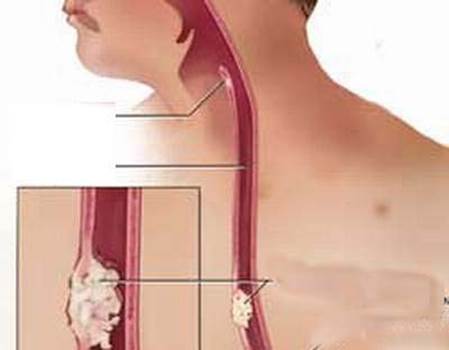Esophageal cancer is the forth malignant
pathology after digestive cancer such as stomachic cancer, liver cancer, and
colorectal cancer.
The majority of cases of esophageal cancer have
poorly clinical manifestations in early stage, so that it’s easy to be confused
with other pathologies in esophagus and throat; more clearly clinical
manifestations are usually in late stage, so treatment is difficult. This
disease is occurred with the old, over 50 years old, male more than female.
Therefore, early detection to have appropriate and prompt treatment is very
important.

Feel
hurt when swallowing can be sign of esophageal cancer.
Causes and motivating factors
Esophageal cancer is concerned much with
old and gender, it is often in the old, about 80% of the patients who are
diagnosed esophageal cancer are 55 – 85 years old. Males have three times as
risk of disease as females; the original cause of this disease is by abusing
wine and cigarette. Smoking cigarette increases obviously the risk of cancer
and the risk goes up more and more if combining with wine.
Moreover, there are other cases, esophageal
cancer is often found at those who are obesity, have esophageal pathologies
such as reflux oesophagitis, achalasia; have diet with less cellulose,
vegetables and fruits, lack of vitamin A, B2 and C; eating foods containing
nitrosamine such as bacon, pickled vegetables…
Some other diseases can be premise for
development of esophageal cancer such as esophageal Barrett, small bowel,
celiac by gluten, thickens of the sole.

Esophageal
cancer is one of the most common cancers in
females.
What are manifestations?
Difficult swallow is the most frequently
symptom. At the first time, patients feel difficult to swallow but not pain,
then difficult to swallow coming with pain; at first, difficult to swallow with
rigid foods, and then with liquid foods, and even with saliva.
Discharging saliva often goes with smell
breath, heartburn and choke. Sometimes, you feel uncomfortable while eating.
When cancer spreads, you have chest pain.
Weight loss is significant symptom caused
by lose appetite and difficult swallow, so patients are usually suffered from
dehydration and fatigue.
Anemia is light and occurs slowly but sometimes
bleeding clearly causing acute anemia; especially in case that cancer goes into
main artery leading to bleed in esophagus and sudden death.
Other symptoms can go with the development
of tumor such as feeling of entanglement, heaviness and dull ache pressing on
sternum. After that, depend on effect of tumor on near organs, patients can
have shortness of breath, hoarseness, cough, phlegm, epigastria pain, nausea,
vomiting, and hiccough.
To prevent esophageal cancer, you need to
avoid smoking cigarette, decrease wine and harmful foods, control and prevent
esophageal pathologies. Increase protective factors by eating more vegetables
and fruits, supplementing vitamin and necessary trace elements especially
vitamin A, B2, C, E, and selenium. For patients who have other esophageal
pathologies, you need to make endoscopy of stomach and esophagus regularly
every 6 months to 1 year in order to control, and early find out signs of
esophageal cancer, then having early treating method to make better result.
What to do to diagnoses?
Early diagnoses of esophageal cancer is
very important, it is concerned with periodic health examination in those who
have high risk of esophageal cancer as the old, smokers, alcoholism, obesity,
and having previously esophageal pathologies such as gastro-esophageal reflux,
metaplasia and dysplasia of esophageal mucosa. When finding out any doubtful
signs, patients need to see doctors to be checked and diagnosed early.
Diagnosing esophageal cancer is based on symptoms combining with X-ray and
other tests. Endoscopy coming with biopsy and ultrasound is the best method to
diagnose early and exactly esophageal cancer.
X-ray
Baryt X-ray of esophagus should be taken on
lying position; Baryt in highly mucous level can show hard image of a part of
esophagus, narrow image of esophagus, image of tumor occupying esophagus, being
asymmetric and having rough edge.

When
tumor spreads, patients feel chest pain.
CT
density
It helps to diagnose more early and exactly
than Baryt X-ray, especially when tumor spreads into esophageal wall. Moreover,
it also finds metastasis into mediastinum.
Endoscopy
Esophageal endoscopy with biopsy is
compelling test in case that the images of endoscopy or Baryt X-ray cannot
identify disease. They also support to evaluate level of cancer’s spread and
nature of tumor. Furthermore, combining endoscopy and cytology dye give
positive result with cancer up to 90% of cases.
Ultrasound
through endoscopy
This method diagnoses more sensitively than
scanner. It also helps to anticipate depth of tumor which spreads into
esophageal wall up to 80% of cases, and evaluate penetration of cancer into
esophageal lymph nodes better than scanner.
Treatment
Depend on specific cases, nature and
developing stage of tumor, and whole body condition to choose appropriate
treatment. At present, there are 3 common methods to treat esophageal cancer
including operation, chemotherapy, and radiotherapy. In which, operation is
main treatment; it can combine with chemotherapy or radiotherapy. Moreover, you
need to support your body during treatment by suitable foster, curing symptoms
and decreasing side effects of treatment caused by chemicals and radiation.